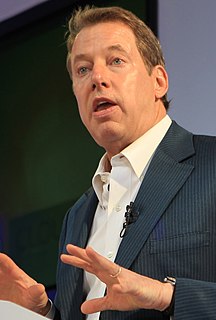A Quote by Jean Chretien
It is not the government's purpose to make a profit the way a company does, because a company doesn't have to give a damn about the unemployed poor or provide services that are non-commercial by definition.
Quote Topics
Related Quotes
I dismiss personal profit and focus exclusively on people and planet. That's what I call social business: a nondividend company dedicated to solving human problems. You can go all the way, forgetting about personal profit, being single-minded about solving problems. The company makes profit, but profit stays with the company.
Companies that actually survive and flourish are going to change their business model from production to aggregating the networks and the network services and solutions. If you're a construction company or an IT company or a logistics company or an information data operation, to the extent that you can find ways to help build the commons, you can get some commercial value in that.
You have to have a government to provide you with legal order, with stability, enforcement of property rights, enforcement of contracts, definition of rules and regulations - the rules of the game, so to speak - and to provide certain shared goods and services, public services. Several people have tried to estimate this and they come out with figures like government spending at 15% of GDP. In the modern world it has gone to 40% or above. So we are way beyond the optimal, and that is easier to say than what the optimum is.
Make sure you comfort everybody, because you have so much power. The influence you do have, make sure you use that for the right things that's going to propel you, and propel your company. It's not always about making profit. I know y'all know how to make profit, and I know that's what it's about! But I'm very happy that I can come here and tell you I'm someone that has not been driven by the profit. You can succeed with the people.
What a reason the Company has for observing its Rules faithfully: to do what the Son of God came into the world to do! That there should be a Company, and that it should be the Company of the Mission, composed of poor men, and that it should be entirely dedicated to that purpose, going here and there through hamlets and villages, leaving the towns behind-something that's never been done-and going to announce the Gospel only to persons who are poor; yet, those are our Rules!
To me, leadership is about first defining purpose. Why does a company exist and what problem does it solve for customers? How is it different than everyone else, and what difference do they plan to make in the world? Companies (and people) should be measured based on the impact they make in the world. If the purpose and solution are solid, the money will follow.
Barrels are very difficult to find. But when you have them, give them lots of equity. Promote them, take them to dinner every week, because they are virtually irreplaceable because they are also very culturally specific. So a barrel at one company may not be a barrel at another company. One of the ways, the definition of a barrel is, they can take an idea from conception and take it all the way to shipping and bring people with them.
At Travelers, we were much more opportunistic. It was very successful, but it wasn't an integrated financial services company. We had a property casualty company, a life company, a brokerage company. We were a financial conglomerate. It wasn't a unified, coordinated strategy of any sort. When it merged with Citi, that became a big issue; Citi, at that time, wasn't yet a fully integrated, coordinated company.












































